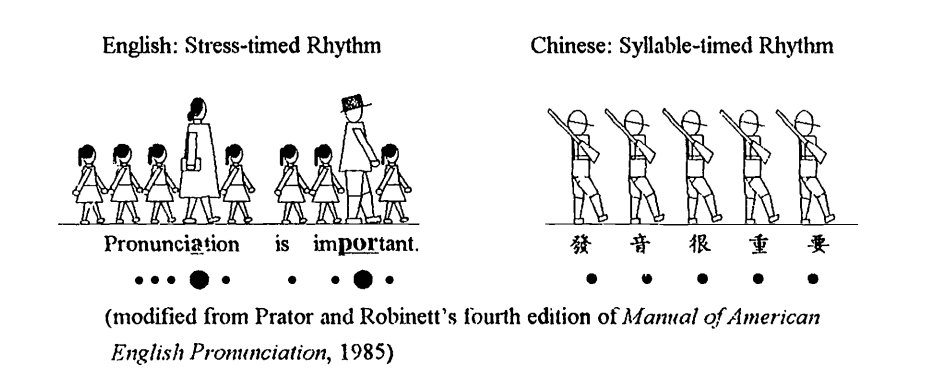|
“My vowels and consonants are not correct.” I hear this frequently during my consultations with native Mandarin and Cantonese speakers who want to improve their English pronunciation. These are advanced English speakers who use the language comfortably at work and in their communities. The truth is, more often than not, their pronunciation of individual sounds (vowels and consonants) is generally correct. What’s not correct is the overall rhythm of their English. And rhythm impacts the pronunciation of individual sounds. So that’s why I said “generally” correct. Chinese speakers who use the rhythm of their native language when they speak English can be either difficult to understand or sound choppy. And choppy English means your listeners have to work harder to comprehend your speech, since it is not the language’s natural “music”. Once your listeners have to work harder to understand you, they can get tired, frustrated, or easily distracted. If you are trying to influence or persuade people at work, which many of my clients are, that can be a problem. The Rhythm of American English versus the Rhythm of Chinese What is rhythm in language? Rhythm is the timing patterns among syllables. A syllable is a word, or part of a word with a vowel sound. For example: “Pot” has 1 syllable because it has 1 vowel sound. “Potato” has 3 syllables. Different languages have different syllable patterns. There are two common patterns: stress-timed and syllable-timed.
English is a stress-timed language. It alternates between stressed and unstressed syllables. For instance, we stress the middle syllable in po-tA-to. We do not say all three syllables equally: po-ta-to. In contrast, Chinese is a syllable-timed language. The syllables may have different tones, but they are essentially all pronounced with the same length and volume. Here’s a simple illustration that I show my Chinese-speaking clients to make the difference clear: As you can see, the two languages have very different rhythms. If you use the rhythm of one language to speak the other, that contributes to your accent. In other words, your accent is not based only on how you pronounce individual sounds. Your accent is also based on the rhythm of your English.
Remember, it goes both ways. Americans who learn Mandarin or Cantonese as adults will want to use the stress-based rhythm of their native tongue. Plus, they will likely have challenges with the tones. Both of these impact how hard their listeners have to work to make sense of their Chinese speech. What is the Number One Thing Chinese Speakers Can Do to Improve their American English Pronunciation? Work on the rhythm, or what I like to call the “music”, of English. To repeat, my clients speak English at an advanced level. I am not referring to lower-level English learners. Clear vowel and consonant pronunciation is critically important to speaking English clearly. But at advanced levels the challenges I hear most are with rhythm, not sounds. Rhythm not only includes syllable stress, but also which key words you emphasize in a sentence. In the illustration above, "pronunciation" and "important" are the key words in the sentence. I have found that key word stress is more intuitive for my Chinese-speaking clients than syllable stress. If you know the language well, you can feel which words are the most important. But syllable stress is more challenging. Last but not least, there are pauses. Looking again at the illustration, do you see that break between the words “Pronunciation / is important.”? That break represents a small pause. English is full of pauses. They are a natural and essential part of the "music". Sometimes my Chinese-speaking clients do not pause enough and speak too quickly. This is especially true when they speak to groups and the nerves kick in! Are You Ready to Work on the Music of English? Many of my clients are relieved that they don’t have to completely modify how they are pronouncing individual English sounds. Changing individual sounds is extremely hard. Because of the repetition required, it's really time-consuming and can be a bit boring. What's more change is simply not possible for many of us. By the time we are adults, the way we make vowel and consonant sounds is too hard-wired in our brains and in our mouths. That's why “The Music of Spoken English” is one of our most popular pronunciation/accent clarity packages. In just a short amount of time, we teach you the essential elements of this music, and provide you practice both between lessons and after the package. If you’re interested to learn more, please read about our pronunciation services, and then schedule a free consultation. I look forward to meeting you / and helping you achieve clear / confident English! |
AuthorTips and tidbits about speaking English well from Karen Schiff, founder of Well Said Coaching. Archives
February 2024
Categories
All
|


 RSS Feed
RSS Feed
